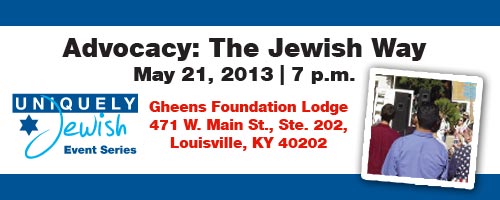[by Cynthia Canada, Freelance Writer]
The Uniquely Jewish event on Tuesday, May 21, combined good food and challenging discussion in a setting that brought nature indoors, thanks to the rustic but airy design of the Gheens Foundation Lodge in the Parklands of Floyds Fork.
About 30 people attended the dinner, catered by Jarfi’s, and the talk by Ethan Felson. Several attendees gathered early on the deck overlooking Floyds Fork, the Salt River tributary that runs through the park; the view was tranquil and the breeze perfect. That natural beauty carried indoors, still clearly visible through massive window walls that are not just “floor to ceiling,” but “ground to sky.”
After the social gathering, Jewish Community of Louisville President and CEO Stu Silberman welcomed everyone and introduced JCL staff and Board members, as well as a group of visitors from Lexington. He then turned the podium over to Becky Ruby Swansburg, chair of the event, who introduced Felson, vice president and general counsel of the Jewish Council for Public Affairs, who was there to talk about “Advocacy: The Jewish Way.”
Felson has more than one tie to Louisville. He pointed out Marie Abrams, who is very special to him because, when he was a “scared kid of 22 or 23 at [his] first JCRC Plenum,” not knowing anyone and feeling overwhelmed, “You were nice to me!”
He recounted how Abrams made a point of engaging him in conversation and how he relished other, later conversations, which became “longer and more involved as bourbon entered the picture.”
Felson also has a tie to Louisville through the Presbyterian Church (U.S.A.), which has in recent years led a mainstream Protestant move toward a policy of boycotting and divestment from corporations doing business with Israel. On that note, he said he wanted to talk less about advocacy as “the Jewish way,” and more about “reconstructing advocacy the Jewish way.”
We generally think of advocacy in terms of “knowing the issue.” Conventional wisdom teaches the way to engage in debate is to know our position, understand the talking points, present them to the decision makers, and shoot down objections. Unfortunately, this leads to “self-resonating rhetoric,” in which we eventually converse only with people who agree with us. We don’t talk face to face with our adversaries, because we know they’re just going to try to shoot us down – and after all, they’re wrong!
Our society has a civility problem, according to Felson. We’re attacking each other, but we’ve forgotten how to engage productively.
The way to change people’s minds, he said, is not to educate them on history or argue in favor of a government or political system. The effective way to accomplish change is to listen – to “allow silence to happen” and let people tell their stories – and then share our own stories. He related the results of a JCRC poll of influential non-Jews, which found none of the deciding moments in these individuals’ positions on the Israeli-Palestinian conflict came from news reports. Each one formed his or her opinion based on the story of someone with whom he/she had personal contact.
It’s about relationships, Felson said. Success with people who are already pro-Israel isn’t really success. Acknowledging that there’s more than one side to the problem and offering to be part of the solution is more effective than persistently presenting one’s own argument. Conversations at a local, not national or international, level will make a difference.
From the audience, there were questions about how to balance the policy of “more listening” against potential relationships with groups who offer support but with whom we disagree on other issues. Felson pointed out that we have worked for decades with others on social justice matters, even though we may disagree sharply on other things. “We need a big tent,” he said. “We don’t have to agree on everything.” In any such conversation, it’s understood that on this issue, we cooperate, and we lead with the common goal.
In this case, the common goal is the understanding that divestment won’t work; it’s just part of efforts to delegitimize Israel. The common goal is acceptance of Israel’s right to exist as a Jewish State.
The conversation continued over dessert. Swansburg commented, “Ethan really gave us a different lens through which to view how we do interfaith relations and advocacy. It does all come down to relationships, and the strongest place to build relationships is at the local level.”
The Uniquely Jewish event series is presented by the Jewish Federation of Louisville.



